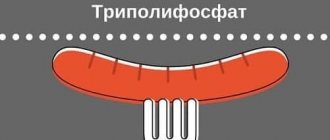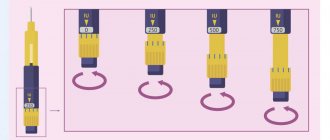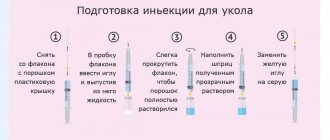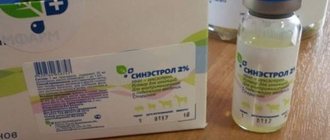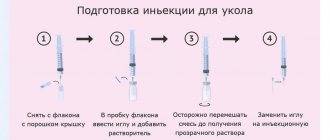How does Clomiphene citrate work?
Clomiphene citrate is a substance that interferes with the formation of female hormones or their action. The drug binds to receptors located in the hypothalamus and ovaries. These receptors interact with female sex hormones. Entering the body in small doses, Clomiphene citrate enhances the release of hormones synthesized by the pituitary gland (gonadotropins, prolactin, follicle-stimulating hormone, luteinizing hormone), which stimulate the activity of the gonads, milk production, the process of egg maturation, and the formation of the corpus luteum. When the female body produces insufficient female sex hormones, Clomiphene citrate has an estrogenic effect, and when the production of estrogen in the woman’s body is increased, it has an antiestrogenic effect. By reducing estrogen levels, the drug stimulates the production of gonadotropins. When using large doses of the drug, the secretion of gonadotropins is inhibited. The drug does not have androgenic and progestogenic activity.
Description and effect on the body
The drug affects the body by stimulating the secretory activity of gonadotropins. It provokes an increase in the activity of the sex glands and promotes the production of hormones in the pituitary gland. Clomiphene also affects other body functions:
- Stimulates milk secretion.
- Optimizes the process of egg maturation.
- Causes the formation of corpus luteum in the ovaries.
All these processes contribute to the maturation of the egg, ready for the process of conception. As a result of using the drug, the ovulation process is stabilized. If the body contains a small amount of endogenous estrogens, the drug increases their amount, bringing the total number to the norm necessary for effective fertilization. When estrogen levels rise, Clomiphene citrate has a blocking effect, preventing estrogen from circulating. This property of the drug helps improve the dynamics of gonadotropins. Important in the use of the drug is the fact that it does not have an androgenic or gestagenic effect.
When to use Clomiphene citrate
Clomiphene citrate is used in certain doses to treat the following disorders:
- to stimulate ovulation
- in case of impaired egg maturation (anovulatory ovarian dysfunction)
- for the treatment of infertility caused by ovarian dysfunction
- in the absence of menstruation (ovarian dysfunction)
- with uterine bleeding (ovarian dysfunction)
- for ovulation disorders caused by endocrine disorders
- with reduced function of the male gonads
- oligospermia
- with delayed sexual development and physical development in boys
- as a diagnostic tool for disorders of the gonadotropic function of the pituitary gland
- for breast cancer
Application
Due to its pharmacological action, Clomiphene citrate is recommended as an effective ovulation stimulator. The drug turns out to be relevant not only for those who are faced with a diagnosis of infertility, but also for dysfunctional uterine bleeding, impaired ovarian functionality, absence of the menstrual cycle, as well as for other pathological diseases that are provoked by incorrect functioning of the ovaries and other causes of hormonal imbalance.
Clomiphene citrate is often prescribed as a diagnostic tool to determine dysfunction of the pituitary gland, which affects the stimulation and dynamics of the glands of the genital organs (gonadotropic function of the pituitary gland).
Mode of application
To stimulate ovulation, Clomiphene citrate is used once a day, before bed. Taking the drug begins on the fifth day of the menstrual cycle, the duration of treatment is five days. If ovulation does not occur, the doctor increases the dose of the drug and the duration of use in the next course. If ovulation does not occur again, then a third course of treatment is carried out. If the treatment does not help, a break of three months follows, then three courses of treatment can be repeated. If there is no effect after repeating courses, treatment with Clomiphene citrate should be discontinued.
In the treatment of breast cancer with metastases to other organs and tissues, Clomiphene citrate is prescribed in large doses in the morning and evening, for a long time. Dose calculations are carried out by the treating oncologist. If the patient's condition worsens due to disease progression, treatment is stopped.
For the treatment of diseases and disorders of the male reproductive system, Clomiphene citrate is prescribed once or twice a day for a long time. For adolescents, the drug is prescribed in courses depending on body weight, with intervals between courses of one to three months.
Combination with other drugs
Clomiphene citrate can be used with other drugs that affect the amount of gonadotropic hormones in the body. In this way, the most effective distribution of the medication throughout the body can be ensured. The drug is gradually eliminated from the woman’s body, but the period, which in medicine is usually called the half-life, is about 5 days! At this time, the drug exhibits maximum effect. The use of Clomiphene citrate in combination with other drugs is recommended for diagnosing neoplasms in the mammary glands and for the early detection of cancer.
Contraindications
The drug is not prescribed:
- pregnant women and nursing mothers
- people with an allergic reaction to Clomiphene citrate
- with a history of benign and malignant neoplasms
- for severe liver and kidney diseases
- with organic lesions of the central nervous system
- with a tendency to thrombosis
- uterine bleeding of unknown etiology
- women with ovarian cysts
- in case of insufficiency of function or tumor of the pituitary gland
- hypersensitivity to the drug
Treatment with the drug should be carried out under the strict supervision of a physician, with regular monitoring of the state of ovarian function. The IVF Center Kursk clinic provides treatment for infertility caused by hormonal deficiency, ovarian dysfunction in women, and impaired spermatogenesis in men.
Indications for use
Clomiphene citrate can be used without reference to meals. The first course of treatment involves a dosage of 50 mg/day (1 tablet). The start of use should coincide with the 5th day of the menstrual cycle. The first course of treatment lasts for five days, after which the use of the drug is stopped. On the 11th day of the cycle (less often the 15th) ovulation should occur. If this does not happen, doctors recommend a second course of treatment. The dosage is doubled (100 mg per day) and the patient takes the drug for 6 days. If ovulation has not occurred, you need to take a three-month break, and then start the third course. In 85% of cases, these methods help to achieve the desired result, but otherwise, the doctor, based on the test results, draws conclusions about the effectiveness of the drug and suggests new treatment methods.
There is another treatment option that is offered when breast cancer is diagnosed. Women who are faced with disseminated cancer, which characterizes the spread of affected cells to other organs and tissues, are prescribed an annual course of treatment, which involves taking Clomiphene citrate for 12 months. The dosage is 200 mg/day (4 tablets of 50 mg). At this time, it is necessary to monitor the functioning of the ovaries and undergo regular examinations with your doctor. If malfunctions occur in the functioning of the ovaries, the course is suspended and treatment is continued after the resumption of functioning.
Therapy using Clomiphene citrate is also relevant for male diseases. Representatives of the stronger sex are prescribed a course of treatment with a dosage of 50-100 mg/day (depending on weight and age). The course of treatment is accompanied by strict monitoring of the qualitative composition of sperm and the results of the necessary studies. The drug is used for six weeks.
Drugs to stimulate ovulation
One of the reasons for infertility in women is the lack of ovulation, when a mature egg does not leave the follicle, which, in fact, should be fertilized by sperm. This condition is called anovulation.
Treatment of anovulation is carried out by stimulating ovulation, for which drugs are used aimed at activating ovarian function, the most popular of which are Clomid, clomiphene citrate, pregnyl and clostilbegit.
Clomid
Clomid was originally developed to treat such a serious disease as breast cancer. However, the drug has not found widespread use in this area of treatment, since it did not live up to high expectations. Later, it began to be used as a medicine that helps stimulate ovulation in women who have problems with conception due to disruption of the ovulatory cycle. Clomid is prescribed in the following cases:
- if the development of anovulation occurred due to the presence of polycystic ovary syndrome (PCOS);
- for infertility of unknown origin: if, from a medical point of view, a woman has no obstacles to conception, but pregnancy does not occur. It is recommended to supplement the use of Clomid with metformin, which helps increase insulin levels and stimulate ovulation;
- for additional guarantees when stimulating ovulation before in vitro fertilization (Clomid increases the chances of a successful pregnancy).
The optimal course of use of this drug should be six months, unless, of course, pregnancy occurs earlier than this, which happens in 30% of cases.
Clomid has minor side effects; while taking it, you may experience pain in the lower abdomen, sleep disturbances, and weight gain. In extremely rare cases, taking Clomid can lead to the development of an ovarian cyst or tumor.
Decayed
Pregnil is a drug based on human chorionic gonadotropin (hCG). Its use is prescribed to women of any age, however, depending on various factors, Clomid has different effects. The purpose of its use as a therapeutic agent in the treatment of infertility is to stimulate the activity of the ovaries as part of an artificial insemination program.
The highest concentration of hCG in a woman’s body is observed 20 hours after the first dose of the drug. Excess medication is eliminated from the body on its own after a few days.
Clomiphene citrate
Clomiphene citrate is not very popular among medical professionals due to its notoriety associated with the side effects of the drug. While taking clomiphene citrate, the size of the ovaries may increase, urination may become more frequent, visual function may be impaired, and vasomotor symptoms may often appear. However, clomiphene citrate is indispensable in cases where folliculometry is not possible. Clomiphene citrate has contraindications: it cannot be used for ovarian cysts.
Klostilbegit
Clostilbegit is rightfully considered one of the most popular drugs that help stimulate ovulation. Its effectiveness especially increases when taking other drugs that have a similar effect. Clostilbegit increases the level of FSH (follicle-stimulating hormone) in the female body, subject to the simultaneous use of medications that help reduce prolactin levels in the process of stimulating ovulation, which ensures its effectiveness.
The dosage of clostilbegit should be calculated by the doctor in accordance with the medical indicators of the patient and the individual characteristics of her body. The absence of ovulation after several courses of taking the drug may indicate the presence of certain pathologies of the reproductive system. A side effect of clostilbegitis may be thickening of the cervical mucus, which interferes with the movement of sperm.
At the IVF Center clinic in Petrozavodsk, specializing in the treatment of infertility, a complex of therapeutic and diagnostic procedures is carried out in preparation for in vitro fertilization. One of them is stimulation of ovulation.
An individual approach to each patient, taking into account the results of diagnostic measures carried out using modern medical equipment, allows the clinic’s specialists to select the most effective procedure for carrying out a procedure that promotes the onset of ovulation.
You can make an appointment with a doctor by phone or on the clinic’s website by filling out the application form.
